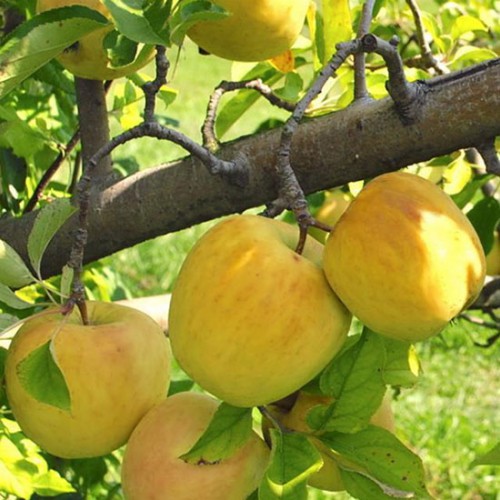
Golden Delicious Apple Tree
Origin: USA
Description:The Golden Delicious Apple Tree is a classic and beloved variety renowned for its sweet flavor and versatility. It is a vigorous grower with a spreading habit, forming a rounded crown that promotes excellent sunlight penetration and air circulation for optimal fruit development. One of its key advantages is its self-pollinating nature, meaning it can produce fruit without the need for another apple cultivar nearby.
Fruit: Golden Delicious apples are characterized by their medium to large size and conical shape. They boast a smooth, golden-yellow skin, occasionally adorned with a subtle red blush. The flesh is crisp and juicy, offering a delightful balance of sweetness and tartness, making them perfect for enjoying fresh, incorporating into baked goods, or using in applesauce. A notable characteristic is their minimal browning when cut, making them an excellent choice for salads and other fresh preparations.
Harvest: The Golden Delicious apple harvest typically occurs from mid to late September, offering a consistent and reliable yield of fruit each year. This variety is well-known for its productivity, providing an abundance of apples for various uses.
Pollination: Although self-pollinating, cross-pollination with varieties such as Granny Smith, Fuji, or Gala can significantly improve fruit set and yield, resulting in a more abundant harvest.
Spacing: To ensure ample space for growth and proper air circulation, it is recommended to space Golden Delicious apple trees approximately 4 to 5 meters apart. While mature trees can reach heights of 4 meters in their standard form, they are often maintained at shorter heights in commercial orchards for easier management and harvesting.
Good to know: The Golden Delicious apple variety is highly valued for its adaptability to diverse climates and soil types, making it a popular choice for both home gardeners and commercial growers. Its resistance to bruising ensures the fruit remains in good condition during handling and storage. Additionally, the apples have excellent storage longevity, extending their availability and marketability. The versatility in culinary applications, ranging from baking to cider production, further contributes to its widespread appeal.
ask prices
- We only sell bare root trees to countries in Europe. We can't export potted trees due to trade regulations.
- We can deliver the trees to all countries in Europe and some countries in Eurasia and Middle East. We can arrange a truck to deliver the trees to your country.
- We are a wholesale nursery. Our minimum order quantity is 3.000 trees. Please note that we don't take orders below this limit.
- Phytosanitary certificates are provided with all orders. These certificates prove the origin of the trees and certify that they are free of diseases.
MM 9 (Dwarf)
M 9 is a dwarf rootstock suitable for high-density planting. It is resistant to the crown rot disease and moderately sensitive to the fire blight and wooly aphid. It is resistant to the illness of the tree tree and mildly susceptible to the blight of flames and wooly aphid. Throughout cultivation, it requires support systems. It should not be grafted on spur-type varieties such as Scarlett Spur, Redchief and Starkspur Golden. For the field, it should be recommended without limiting watering. It is moderately resistant to calcareous and heavy-textured soils. High crop quality, early fruit bearing and elevated efficiency out of a unit region within a brief span of moment are the most advantageous features M 9 offers to the plants.
MM 106 (Middle size)
It is a semi-dwarf rootstock, resistant to wooly aphid and is highly sensitive to disease of crown rot. For heavy-textured and argillaceous soils, it should certainly not be suggested. It has a closer and heavier root structure than rootstocks M9 and M26. Although it is more resistant to the climate than rootstocks M9 and MM 26, it should be chosen for frequent watering plants.For the gardens where MM 106 is grown, support devices are not needed. Within three or four years after planting, it becomes commercially profitable.
MM 111 (Large)
It is a semi-dwarf rootstock bigger than M106 and smaller than standard seedling rootstock. It is resistant to the illness of crown rot, wooly aphid and heavy-textured, argillaceous, calcareous plants with a pH scale above 7. Depending on the circumstances of care, it becomes commercially profitable within four or five years. When early flowering is desired, M 9 may be recommended as the rootstock between the system in some cases. When grafted on spur form and low strength varieties, it provides stronger outcomes.






